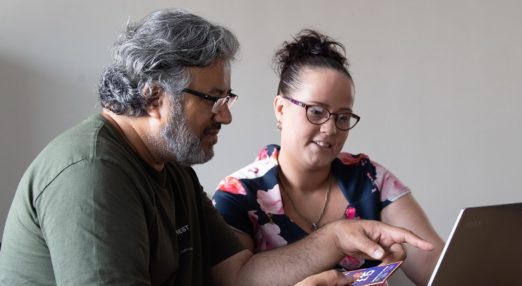Digitals skills gap costs the UK economy and workers £12.8 billion
New research finds that UK workers are missing out on additional earnings of £5.69 billion due to a lack of digital skills according to Virgin Media O2 and economic modelling from Cebr.
With more than 5 million Brits unable to carry out simple online tasks like sending emails or using the internet, new research reveals UK workers are missing out on additional earnings of £5.69 billion due to a lack of digital skills according to Virgin Media O2 and economic modelling from Cebr.
As the UK faces ongoing economic instability and with an uncertain jobs market, the research shows a lack of adequate digital skills could exacerbate problems being faced by cash-strapped Brits struggling to make ends meet. More than a third of Brits feel a lack of digital skills training has held back their earning potential already, and almost a third say they need digital skills so they can shop around for deals and save money – amid rising anxiety over the cost-of-living.
The research shows that 31% of Brits believe they have been passed over for a promotion or pay rise because of a lack of digital skills, a quarter of people in the lowest earning pay bracket (less than £12,570 p/a) feel their skills would be inadequate to secure them a similarly paid role if made redundant, while a fifth say they need digital skills so they can get a job with a higher salary because of the cost-of-living crisis.
In addition, two thirds of Brits say a lack of digital skills is contributing to their stress and anxiety. Almost half (44%) say a lack of digital skills is adversely affecting their ability to look after their mental health and personal wellbeing, for example not being able to book online medical appointments or apply for benefits.
Good Things Foundation’s annual digital inclusion campaign, Get Online Week, helps people with no or low digital skills get online and start their digital skills journey. This week, community organisations across the UK are holding local events to help equip people with the digital skills they need to participate in the online world.
The sessions are designed to help people learn how to use the internet to carry out essential tasks such as word processing, emailing, accessing online services including booking medical appointments, managing their money online, applying for jobs, taking part in virtual interviews, or accessing online education or training programmes.
Virgin Media O2’s support of Get Online Week is part of a three-year partnership with Good Things Foundation, building on Virgin Media O2’s and Good Things Foundation’s pioneering National Databank Initiative.
Helen Milner OBE, Group CEO, Good Things Foundation said:
“It’s really concerning to read that more than a third of Brits feel their limited digital skills are holding back their earning potential. With many people experiencing strains on their finances right now, having the right digital skills to find new employment opportunities and manage money is absolutely essential.
“That’s why Good Things Foundation’s Get Online Week campaign is so important. This week community organisations across the UK are holding events to provide in
person, personalised support to people with low level digital skills. People will be able to build their confidence and gain the skills they need to fully benefit from the online world.
“But with 2 million households struggling to afford internet access in the UK today – and 10 million adults lacking the most basic digital skills, we need to do even more to build a movement for digital inclusion that leaves no-one behind. This underpins our 2022-2025 strategy, making sure we go further to Fix The Digital
Divide – for Good.”
Rafaut, who attends digital skills sessions at North Manchester Community Partnership says:
“During the pandemic, I really struggled as everything moved online including doing things like scheduling and attending GP appointments and booking COVID tests. The digital skills course offered by the North Manchester Community Project supported by Virgin Media O2 and Good Things Foundation gave me the chance to learn and gain the new skills I needed to manage my day-to-day activities.
“It has also given me a much-needed confidence boost. This new skillset has opened so many possibilities and opportunities for me and my wider community, including shopping online, sending emails and managing my healthcare. I really hope others take up these opportunities because the support is out there, it’s just a matter of taking that first step.”
Nicola Green from Virgin Media O2 said:
“With the cost- of-living crisis deepening and Brits facing rising bills, it’s more important than ever that people can gain vital digital skills, so they can apply for better paid jobs and increase their incomes, while boosting the UK’s economy by almost £13 billion. Together with Good Things Foundation, we’re hosting free digital skills masterclasses in community centres across the UK to improve the nation’s digital skills, as part of Get Online Week.
“It’s part of our ambition to upgrade the UK, where we’re committed to improving the digital skills and confidence of two million people by the end of 2025.”
Research based on economic analysis from Cebr who constructed a Digital Skills Index from an online survey run by 3Gem of 3,000 participants across the UK around people’s digital skills. Responses to 39 questions relating to digital skills and income were used to create an index from 0 to 100, covering four distinct digital skill personas used to categorise each respondent: High Digital Skills, Moderate Digital Skills, Low Digital Skills, and No Digital Skills. Multiple linear regression analyses were run, and the resulting coefficients were applied to respondents to find the average earning uplift associated with improving ‘Low Digital Skills’ and ‘No Digital Skills’ to ‘Moderate Digital Skills’. The final impact total was estimated by aggregating the mean earning uplift across the relevant shares of the UK population. To translate the earning uplift to a GVA uplift, an average ratio of earnings-to-COE, and then total COE-to-GVA was applied.
UK population as of October 2022 calculated as 68,690,184 based on Worldometer elaboration of the latest United Nations data.
-

Virgin Media O2 becomes first strategic partner of Good Things Foundation with £2m donation to help fix the digital divide – for good
Virgin Media O2 is donating £2 million to Good Things Foundation to help disadvantaged people across the country get online, stay connected, and gain vital digital skills, as...
-

Virgin Media O2 increases free data gifting amid escalating cost of living crisis
The company is donating an extra 15 million GB of free data to the National Databank to help people in need stay connected as the cost of living...
-

Good Things Foundation launches National Databank
The National Databank launches with support from our partners Virgin Media O2 - following a three month pilot with 10 of Good Things Foundation’s community partners.
